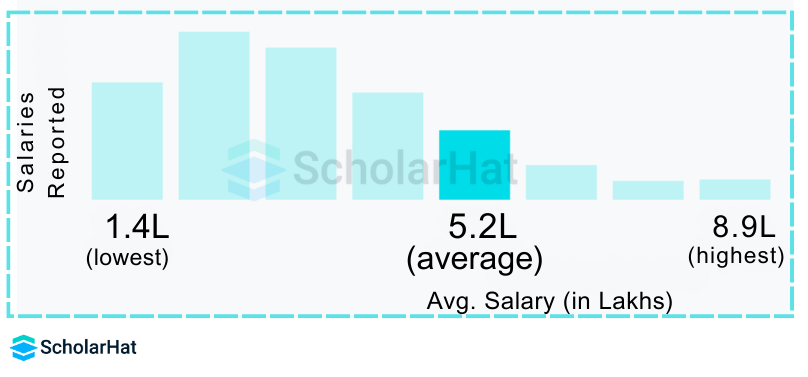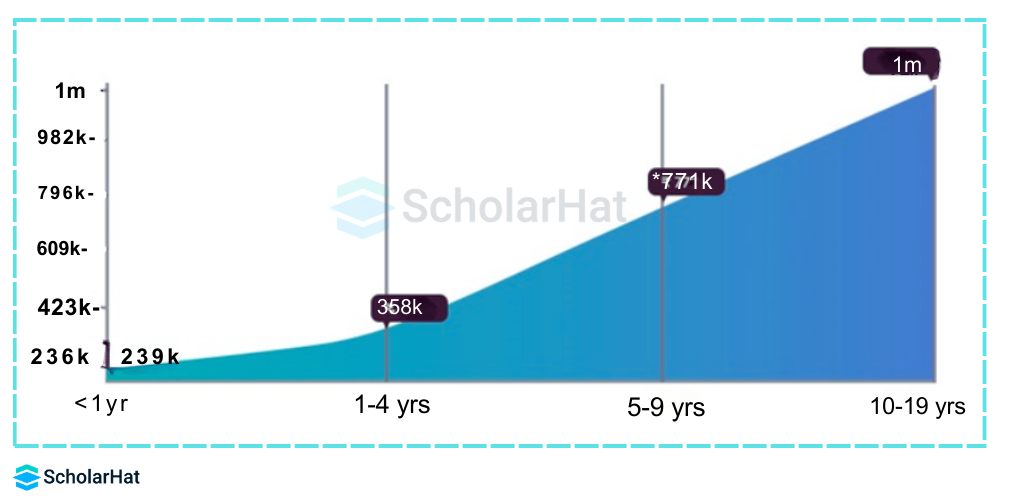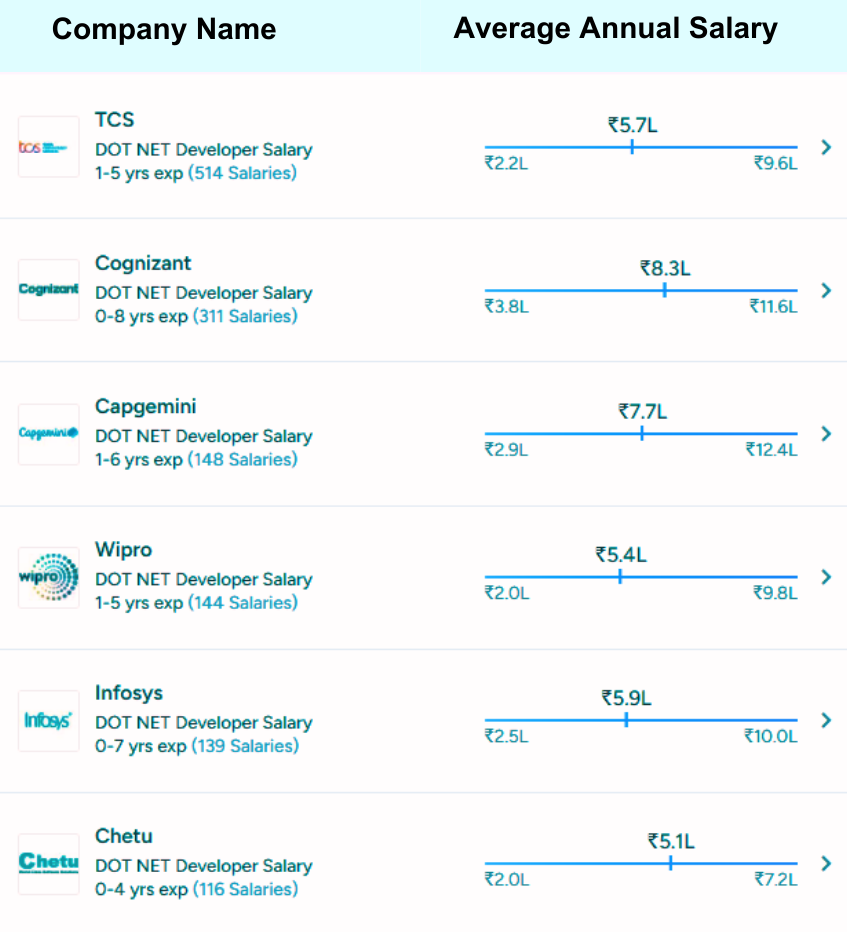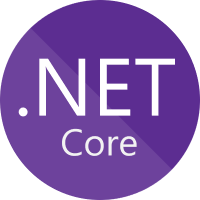02
May.Net Developer Salary in 2025
.NET Developer Salary: An Overview
.NET is an ever-evolving framework developed by Microsoft. When considering a career in any sector, roles, responsibilities, career scope, salary, etc all these aspects come into our mind associated with the sector. In this .NET tutorial, you'll get answers to all such questions if you're thinking of a career in .NET development.
Who is a .NET Developer?
A .NET developer specializes in using the Microsoft .NET framework to build, deploy, and maintain software applications. The following are some of the job responsibilities of a .NET developer:
- Building user interfaces
- Troubleshooting software prototypes
- Providing technical support to users
- Developing programs for .NET applications
- Creating procedures for running the applications
What is the Demand for this Role?
The demand for .NET developers remains consistently high in the software development industry, due to several factors:
- Enterprise Adoption: Many large enterprises and organizations rely on .NET for building mission-critical applications hence, there is a continuous demand for skilled .NET developers to maintain, enhance, and develop new solutions within these environments.
- Legacy Systems Maintenance: Numerous legacy systems and applications are built on the .NET framework. These systems require ongoing support, updates, and modernization efforts, creating a demand for .NET developers with expertise in maintaining and migrating legacy applications.
- Web and Cloud Development: With the rise of cloud computing and modern web development practices, there is an increasing demand for .NET developers skilled in ASP.NET Core, Azure, and other cloud-native technologies.
- Cross-Platform Development: .NET developers can now build cross-platform applications that run on Windows, Linux, and macOS, as well as mobile applications with Xamarin. This versatility has increased the demand for .NET developers with cross-platform development skills.
- Emerging Technologies: .NET continues to evolve, embracing emerging technologies such as machine learning, IoT, etc. As organizations explore these technologies to gain a competitive edge, there is a growing demand for .NET developers with expertise in integrating and leveraging these technologies within their applications.
- Market Dynamics and Job Trends: Job market data and trends consistently show a strong demand for .NET developers across various industries and geographic regions. Job boards, recruitment agencies, and industry reports often highlight .NET development roles among the most sought-after positions in the software development industry.
Read More - Top 50 .Net Interview Questions
What are the Skills Required to Become a .Net Developer?
- .NET Framework and .NET Core: Learn about Common Language Runtime (CLR), Base Class Library (BCL), and core functionalities. Understand the differences between .NET Framework and .NET Core, and learn to leverage their features effectively.
- ASP.NET and ASP.NET Core: Understand concepts like MVC (Model-View-Controller), Web API, routing, middleware, authentication, and authorization. Familiarity with front-end technologies like HTML, CSS, JavaScript, and client-side frameworks (e.g., Angular, React) is also beneficial.
- Desktop Application Development: For this, learn frameworks like Windows Forms and WPF (Windows Presentation Foundation). Get into the concepts related to user interface (UI) design, data binding, controls, events, and MVVM (Model-View-ViewModel) architecture.
- Database Management: Become proficient in database management systems like SQL Server, MySQL, PostgreSQL, or SQLite. Understand database design principles, SQL queries, stored procedures, indexing, normalization, and transaction management.
- Version Control Systems: Learn how to use version control systems like Git for managing source code, collaborating with team members, and tracking changes across projects.
- Testing and Debugging: Develop skills in unit testing, integration testing, and automated testing techniques using frameworks like NUnit, xUnit, or MSTest.
- Deployment and DevOps: Understand the basics of deployment pipelines, continuous integration, and continuous deployment (CI/CD) practices. Learn to automate build, test, and deployment processes using tools like Azure DevOps, Jenkins, TeamCity, or GitHub Actions.
- Problem-Solving and Critical Thinking: Develop strong problem-solving skills and the ability to analyze requirements, identify potential solutions, and make informed decisions.
Must-Have Skills For .Net Developer
- Strong written and verbal communication skills
- A team player and able to collaborate effectively with other teams
- Organizational and time management skills
- Strong troubleshooting, problem-solving, and analytical skills
- Creative, flexible, self-driven, and innovative mindset
- Strong testing and debugging skills
- Attention to detail and ability to plan and organize work
- Ability to learn new languages and technologies
- Adaptability, positive attitude, and proactive
How to Become a .NET Developer?
- Understand the Basics of Programming: Start by learning the fundamentals of programming languages such as C#, which is widely used in .NET development. Understand concepts like variables, data types, control structures, functions, and object-oriented programming (OOP) principles.
- Learn .NET Fundamentals: Familiarize yourself with the .NET framework, including its architecture, components, core functionalities, Common Language Runtime (CLR), Base Class Library (BCL), and concepts like assemblies, namespaces, and types.
- Choose a Learning Path: Determine your area of interest and work on it. It can be web development with ASP.NET, desktop application development with WinForms or WPF, mobile app development with Xamarin, or cloud development with Azure.
- Explore Learning Resources: Take advantage of online tutorials, documentation, books, video courses, and interactive platforms to learn .NET development.
- .NET Tutorial For Beginners
- ASP.NET Core Tutorial For Beginners
- ASP.NET Core Course
- .NET Microservices Course
- Build Projects: Apply your knowledge by working on real-world projects and coding exercises. It will help you solidify your understanding of concepts, develop problem-solving skills, and create a portfolio to showcase your work to potential employers.
- Full-Stack .NET Developer Certification Training Program
- Advanced Full-Stack .NET Developer Certification Training
- .NET Solution Architect Certification Training
- ASP.NET Core Certification Training
- .NET Developer Training With Certification
- Practice Regularly: Dedicate time to practice coding regularly. Solve coding challenges, participate in hackathons, and contribute to open-source projects to hone your skills, learn from others, and stay motivated.
- Stay Updated: Follow blogs, attend webinars, join developer communities, and participate in forums to engage with fellow developers and stay informed about industry trends and innovations.
- Seek Feedback and Mentorship: Solicit feedback on your code and projects from peers, mentors, and experienced developers.
- Apply for Jobs and Internships: Start applying for entry-level positions, internships, or freelance opportunities in .NET development. Tailor your resume and cover letter to highlight your relevant skills, projects, and experiences.
We at ScholarHat offer the following .Net Online Courses and tutorials to learn .NET in a comprehensive manner
ScholarHat offers you the following Certifications where you will work on building real-world projects
.NET Developer Job Description
The job description for a .NET developer may vary according to the company's requirements. The basic skillset more or less remains the same.
The .Net developer job description highlights important skills, qualifications, and responsibilities of .NET developer. The .NET developer is responsible for the overall development process from writing the code to testing, storing, finding errors, and presenting a functional, interactive application. He should be capable of building an entire application and must know different factors important for building a successful .net application.
They not only build feature-rich software products but also look after performance, security, testing, and scalability. He is responsible for communicating with the design and product teams for the visuals and graphics. The developer must be accountable for maintaining the repository of data sets and is expected to have a fundamental knowledge of database systems and SQL servers.
Roles And Responsibilities of a .NET Developer
- Analysis and Requirement Gathering: Collaborate with stakeholders, business analysts, and project managers to understand business requirements, functional specifications, and technical constraints.
- Design and Architecture: Design and architect scalable, maintainable, and extensible .NET applications, systems, and solutions.
- Development and Coding: Develop, implement, and maintain .NET applications, web services, APIs, and components using C#, ASP.NET Core, MVC, Web API, and other .NET technologies.
- Testing and Quality Assurance: Conduct unit testing, integration testing, and system testing to ensure the quality, reliability, and performance of .NET applications. Write test cases, perform code reviews, and participate in peer programming sessions to identify and address defects, bugs, and technical debt.
- Database Management and Data Access: Design and optimize database schemas, tables, indexes, and stored procedures using SQL Server, MySQL, or other relational database management systems (RDBMS).
- Integration and Interoperability: Integrate .NET applications with third-party systems, services, APIs, and external data sources using RESTful APIs, SOAP services, and message queuing systems.
- Documentation and Knowledge Sharing: Create and maintain technical documentation, architecture diagrams, design documents, and code comments to facilitate understanding, maintenance, and knowledge transfer.
- Deployment and Release Management: Package, deploy, and release .NET applications using continuous integration/continuous delivery (CI/CD) pipelines, deployment automation tools, and version control systems (e.g., Git).
- Maintenance and Support: Provide ongoing maintenance, support, and troubleshooting for .NET applications, addressing user-reported issues, system failures, and performance degradation.
- Continuous Learning and Improvement: Stay updated with the latest trends, technologies, and best practices in .NET development, software engineering, and related domains. Attend training programs, conferences, webinars, and community events to enhance skills, expand knowledge, and contribute to personal and professional growth.
.Net Developer Salary: How Much Are They Paid?
So, when you decide to start your career as a .Net Developer, you need to know the Salary Structure for this role in the industry.
The average annual salary of a .NET Developer in India is Rs. 5.2 LPA.

There are some factors on which the salary of a .NET Developer depends:
- Experience

Data Source: https://www.payscale.com/research/IN/Job=.NET_Software_Developer_%2F_Programmer/Salary
- Location
Location Average Base Salary/year (In INR) Delhi ₹439,162 Mumbai ₹428,674 Kolkata ₹338,000 Hyderabad ₹415,746 Banglore ₹597,475 Data Source: https://www.payscale.com/research/IN/Job=.NET_Software_Developer_%2F_Programmer/Salary
- Employer

Data Source: https://www.ambitionbox.com/profile/dot-net-developer-salary
- SkillSet
Skill Set Average Base Pay/annum (In INR) C# ₹448,978 Microsoft SQL Server ₹435,032 ASP.Net Framework ₹422,328 Bootstrap ₹500,000 .Net Core ₹685,000 Data Source: https://www.payscale.com/research/IN/Job=.NET_Software_Developer_%2F_Programmer/Salary
Read more:
- .NET8 Developer Roadmap for 2025
- What is the difference between .NET 7 and 8?
- What's new in .NET 8? Discover ALL .NET 8 Features
- Why a Tech Stack .NET Developer Should Upskill?
- .NET Developer Should Learn Azure or AWS?
FAQs
- Using .NET infrastructure to create software solutions to meet the customer's requirements
- Collaborating with internal teams to produce software architecture and design
- Organizing meetings with the clients to discuss the project details
- Writing code aligning with the customer's brief and requirements
- Preparing and maintaining code for various .NET applications and resolving defects in systems
- Ensuring error-free code, adhering to the coding and development best practices
- Project Managers
- Business Analysts
- UI/UX Designers
- Database Administrators (DBAs)
- Quality Assurance (QA) Engineers
- System Administrators
- .NET Framework and .NET Core
- ASP.NET and ASP.NET Core
- Frameworks like Windows Forms and WPF (Windows Presentation Foundation)
- SQL Server, MySQL, PostgreSQL, or SQLite
- Testing and Debugging
- Deployment and DevOps







